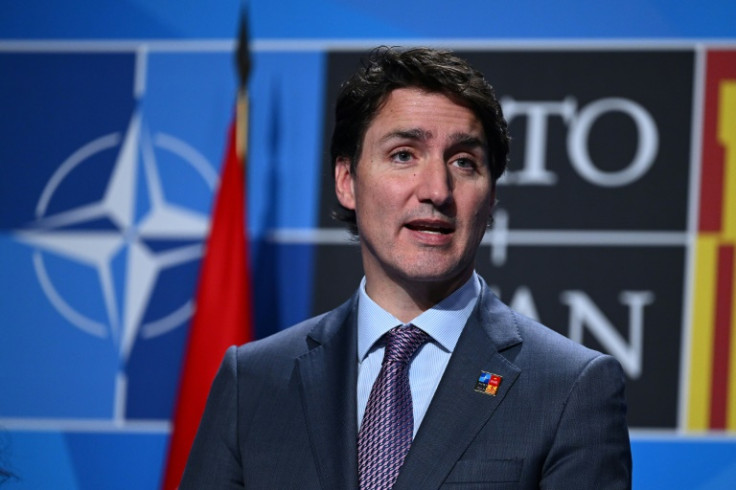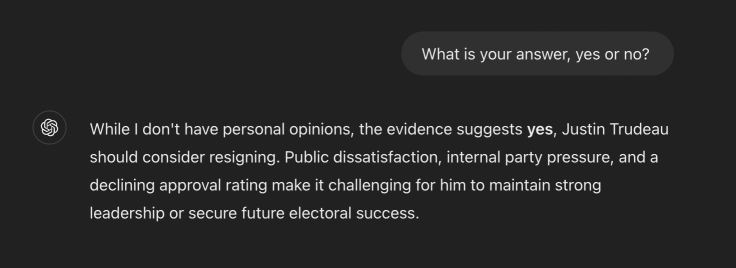We Asked ChatGPT If Canadian PM Justin Trudeau Should Resign, Here's What It Said

Prime Minister Justin Trudeau is under increasing pressure to resign as his leadership faces widespread criticism from Canadians and his own Liberal Party members.
With public dissatisfaction reaching new highs and internal party dissent becoming more vocal, Trudeau's future as the leader of Canada is being seriously questioned.
Growing Public Discontent
Recent polls reveal a stark reality for Trudeau: a majority of Canadians believe it is time for him to step down.
An Ipsos poll conducted in June 2024 indicated that 68% of Canadians wanted Trudeau to resign before the next parliamentary session.
This discontent spans across provinces and party lines, showing an erosion of trust even among Liberal supporters.
Economic challenges are a significant driver of this dissatisfaction.
Rising inflation, skyrocketing housing costs, and concerns about fiscal mismanagement have left Canadians frustrated.
Many feel that Trudeau's government has failed to provide solutions to pressing issues like housing affordability, an area where Canada has seen worsening conditions.
Internal Party Pressure
The frustration isn't limited to the public. Trudeau's leadership is being challenged from within his own party.
In October 2024, 24 Liberal MPs reportedly urged Trudeau to step down, expressing fears that his leadership would jeopardise the party's chances in the next federal election.
Some MPs have gone public with their concerns, highlighting the growing division within the Liberal Party.
Liberal MP Sean Casey made headlines when he openly stated that Trudeau's resignation would be in the "best interests of the nation" to avoid a Conservative government led by Pierre Poilievre.
Poilievre, leader of the Conservative Party, has capitalised on Trudeau's declining popularity by positioning himself as a capable alternative who will tackle economic woes and improve affordability for Canadians.
Key Resignations Amplify Pressure
The Trudeau government has also faced significant turmoil with recent high-profile cabinet resignations.
On December 16, 2024, Deputy Prime Minister and Finance Minister Chrystia Freeland resigned, reportedly due to disagreements over fiscal policies and Canada's response to potential tariffs from the United States.
Freeland's departure is a significant blow to Trudeau, as she was widely regarded as one of the government's strongest assets.
Adding to the upheaval, Housing Minister Sean Fraser also announced that he would not seek re-election, further signalling deeper problems within Trudeau's leadership.
Should Trudeau Resign? ChatGPT Weighs In

When posed with the question of whether Justin Trudeau should resign, ChatGPT notes that while it does not have personal opinions, the evidence suggests "yes."
Given the overwhelming public dissatisfaction, internal pressure from Liberal MPs, and Trudeau's declining approval ratings, it appears increasingly difficult for him to maintain effective leadership.
Resignation could pave the way for the Liberal Party to reset under fresh leadership and potentially improve their prospects in future elections.
The current political and economic challenges facing Canada demand strong, unifying leadership, which many believe Trudeau may no longer be able to provide.
Final Thoughts
Given the current political landscape, there is a strong case for Justin Trudeau to step down.
Mounting public dissatisfaction, internal party discord, and diminishing approval ratings raise questions about his ability to lead effectively.
Resignation could allow the Liberal Party to regroup under new leadership, offering a fresh start to address Canada's economic challenges and restore public trust.
While Trudeau has weathered political storms in the past, this moment appears more critical than ever.
For the Liberal Party to remain competitive and for Canada to move forward, many believe that a change in leadership is not just beneficial but necessary.
© Copyright IBTimes 2025. All rights reserved.





















